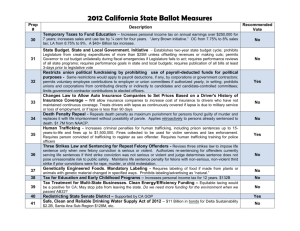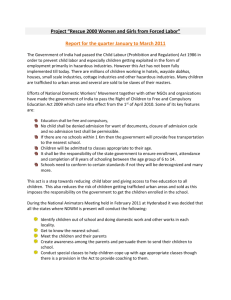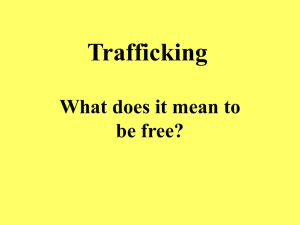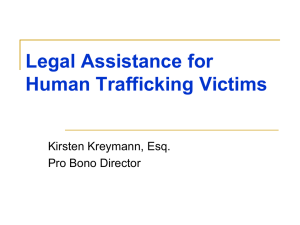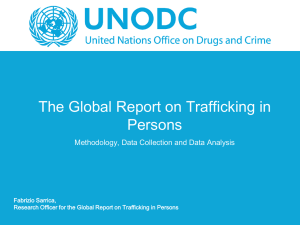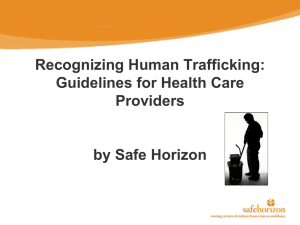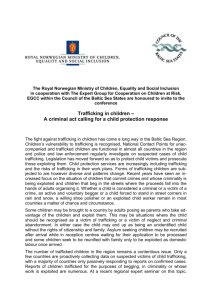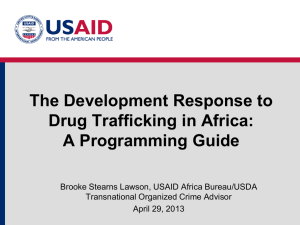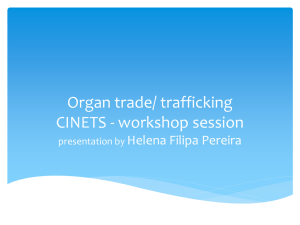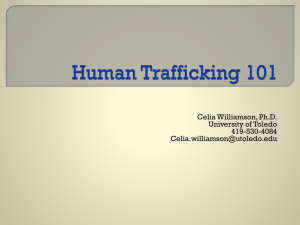here - FELICITY GERRY QC
advertisement
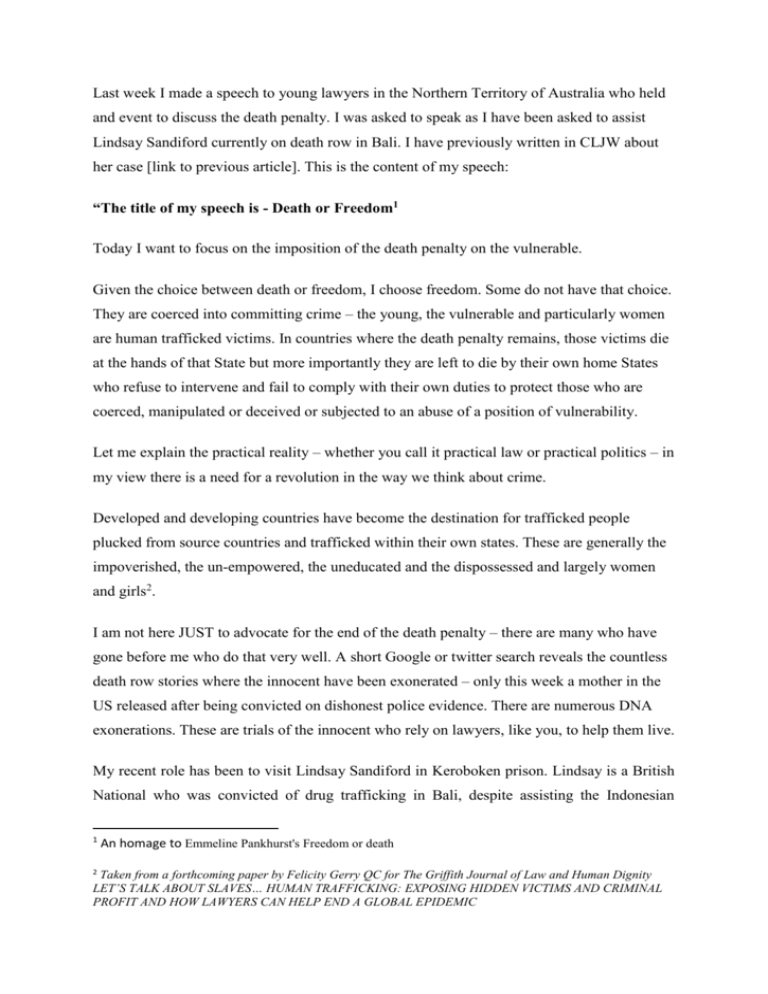
Last week I made a speech to young lawyers in the Northern Territory of Australia who held and event to discuss the death penalty. I was asked to speak as I have been asked to assist Lindsay Sandiford currently on death row in Bali. I have previously written in CLJW about her case [link to previous article]. This is the content of my speech: “The title of my speech is - Death or Freedom1 Today I want to focus on the imposition of the death penalty on the vulnerable. Given the choice between death or freedom, I choose freedom. Some do not have that choice. They are coerced into committing crime – the young, the vulnerable and particularly women are human trafficked victims. In countries where the death penalty remains, those victims die at the hands of that State but more importantly they are left to die by their own home States who refuse to intervene and fail to comply with their own duties to protect those who are coerced, manipulated or deceived or subjected to an abuse of a position of vulnerability. Let me explain the practical reality – whether you call it practical law or practical politics – in my view there is a need for a revolution in the way we think about crime. Developed and developing countries have become the destination for trafficked people plucked from source countries and trafficked within their own states. These are generally the impoverished, the un-empowered, the uneducated and the dispossessed and largely women and girls2. I am not here JUST to advocate for the end of the death penalty – there are many who have gone before me who do that very well. A short Google or twitter search reveals the countless death row stories where the innocent have been exonerated – only this week a mother in the US released after being convicted on dishonest police evidence. There are numerous DNA exonerations. These are trials of the innocent who rely on lawyers, like you, to help them live. My recent role has been to visit Lindsay Sandiford in Keroboken prison. Lindsay is a British National who was convicted of drug trafficking in Bali, despite assisting the Indonesian 1 2 An homage to Emmeline Pankhurst's Freedom or death Taken from a forthcoming paper by Felicity Gerry QC for The Griffith Journal of Law and Human Dignity LET’S TALK ABOUT SLAVES… HUMAN TRAFFICKING: EXPOSING HIDDEN VICTIMS AND CRIMINAL PROFIT AND HOW LAWYERS CAN HELP END A GLOBAL EPIDEMIC police to identify those who coerced her into importing cocaine. She was initially treated as a witness and then a decision was made to charge her with offences. She is currently sentenced to execution by firing squad but needs to raise her status as a coerced individual (along with other issues) on appeal to the Supreme Court of Indonesia in Jakarta. Lindsay’s events commenced in London. The UK has a positive duty to investigate trafficking in human beings but has (thus far) refused to fund her defence. I have asked to meet with the Foreign and Commonwealth Office on her behalf when I am in London later this week. I am acutely aware that I am speaking to an audience of young Australian lawyers who are concerned about the fate of their citizens. I saw Lindsay on the day that Chan and Sukamaran (Australian citizens) were taken to the island. She may be next. I also met Tony DeMalmanche (a NZ citizen) who is on trial in Bali for drug trafficking allegations where he was coerced, manipulated, deceived – one might say effectively duped. Interestingly, protection for human trafficked victims in Indonesia is mandatory. A human trafficking law which is more progressive than other countries. The UK is reportedly under fire over its support (via the UN Office on Drugs and Crime) in relation toSaudi Arabia’s efforts to combat drug trafficking at a time when the death penalty is increasingly being used against drug mules in the kingdom3. By 17 February this year, the Saudi authorities had reportedly executed 31 people, putting the country on course to surpass the 240 people executed in 2014. Of these, 11 appear to have been charged with drugs offences. According to Saudi media reports, a number of those executed were then “crucified”, a practice that involves placing the severed head of the offender back on the body and mounting it on a cross for display4. It is easy to blame Saudi Arabia and Indonesia but the issue is a much more complex global issue: Executing drug mules means that ALL States effectively sanction human trafficking. Responsibility lies not just with the States who still use murder as a form of sentencing but with those Nations who fail to protect their own citizens who are trafficked abroad are complicit if their citizens die. Source countries and destination countries have the same duties in my view. 3 4 http://www.theguardian.com/world/2015/mar/22/uk-links-saudi-drug-mule-executions Ibid n2 Tackling human trafficking is a global imperative - it seems strange it should have to be explained – most victims of human trafficking are women – demanding the end of the death penalty is just part of the battle that is being waged by and for women to end exploitation. According to some, a drug trafficker is of no value to the community at all; the assumption is that they are dangerous people. These are human beings. Many drug traffickers are blind mules who are human trafficked victims fulfilling the definition in the Trafficking Protocol.. What are their home countries doing to save their lives? Signing and ratifying a trafficking protocol is pointless if no effort is made to save the lives of the coerced, the young and the vulnerable. We traditionally think of organised crime in the context of fraud, money laundering and drug trafficking. Meanwhile there is a massive global trade in people, We have the opportunity to raise this grievance before our own Governments and legislature. We, as lawyers, do not have to submit indefinitely to an unjust state of affairs. Cooperation between nations is imperative. Developing the role of lawyers to combat human trafficking is a contribution to the global effort to end human trafficking and it starts with legal assistance for those on trial or on appeal. These are the efforts that should be made by Australia, by New Zealand and by the UK. In my opinion the situation of our citizens facing the death penalty abroad demonstrates the utter failure of our home countries to understand the difference between freedom and death. Felicity Gerry QC 24th March 2015
